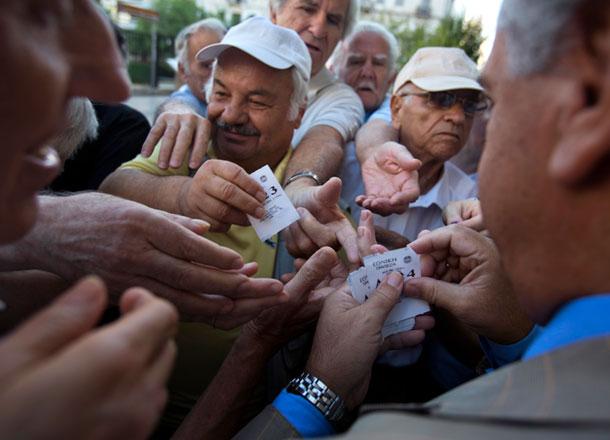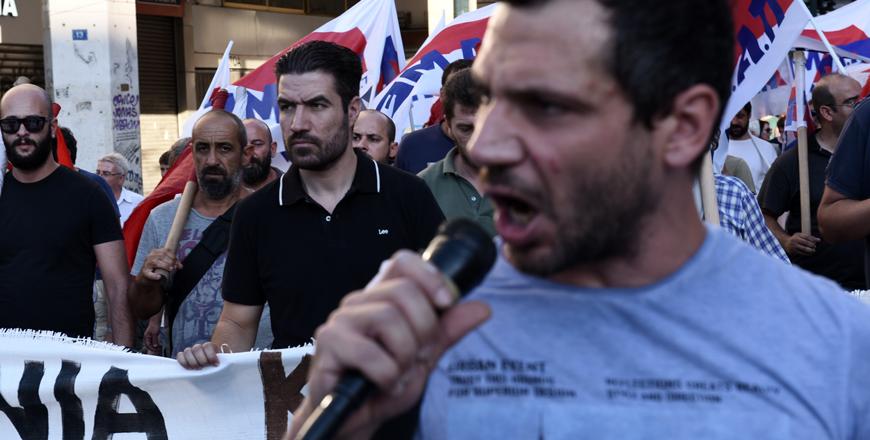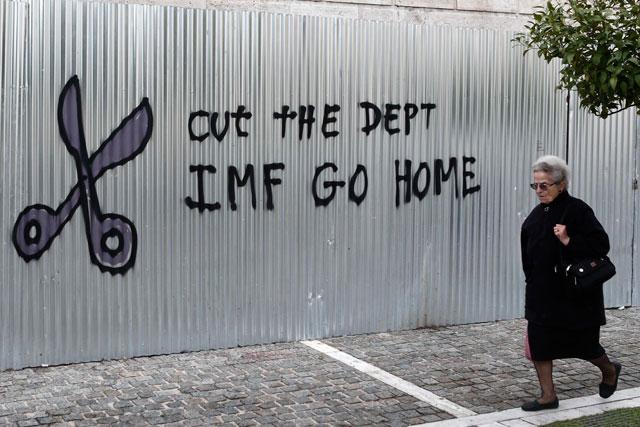You are here
Greece bill on tough bailout deal goes to parliament
By AFP - Jul 14,2015 - Last updated at Jul 14,2015

Butchers wait for clients in a meat market in central Athens, on Tuesday (AP photo)
ATHENS — Greece's government on Tuesday submitted tough bailout terms demanded by eurozone creditors to parliament, as Prime Minister Alexis Tsipras battled for support for the draconian reforms from his ruling anti-austerity Syriza Party.
With around 30 hardline Syriza Party lawmakers threatening to oppose the latest reforms demanded by Greece's international creditors, Tsipras faced the unenviable task of turning to pro-European opposition parties to push the deal through parliament by Wednesday.
In the agreement struck Monday with the eurozone to prevent Greece crashing out of the euro, the parliament in Athens must pass sweeping changes to labour laws, pensions, VAT and taxes.
Only then will the 18 other eurozone leaders start negotiations over what Greece is to get in return: a three-year bailout worth up to 86 billion euros ($95 billion), its third rescue programme in five years.
Europe's main stock markets marked time on doubts whether the bailout would win Greek lawmakers' approval.
"Mr Tsipras's Syriza government may see significant rebellion and approval of the deal in the Greek parliament will probably only be possible with the help of opposition parties — and even then, it is not completely certain it will pass," said strategist Kit Juckes at French bank Societe Generale.
With much of his party up in arms, Tsipras loyalists were hard at work to convince sceptics that the cuts could be softened through alternative measures.
But a number of prominent leftists, whose party was voted in January on an anti-austerity ticket, refused to budge.
"The great majority of Syriza organisations oppose this agreement... in terms of labour and pension issues this is worse than the last two bailouts," lawmaker and parliament vice-president Despoina Haralambidou told Vima FM radio.
Syriza's junior coalition partner, the nationalist Independent Greeks Party (ANEL), said it would not approve the measures but would stay in the government.
Tsipras has predicted "the great majority of Greek people" will support the deal, which he said includes help to ease Greece's huge debt burden and to revive its crippled banking system.
The last-ditch deal is aimed at keeping Greece's economy afloat amid fears its banks were about to run dry and trigger its exit from the single currency.
French President Francois Hollande insisted there was no humiliation for Greece in the deal struck in Brussels.
'Humiliation and slavery'
Many ordinary Greeks are sceptical the deal can bring any improvement to their lives. Some expressed their anger on social media, with the Twitter hashtag #ThisIsACoup trending.
Greece's public servants are also to stage a 24-hour strike on Wednesday, the first big stoppage since Tsipras took power.
Haralambos Rouliskos, a 60-year-old economist, described the deal as "misery, humiliation and slavery".
The eurozone creditors "are trying to blackmail us," said Katerina Katsaba, a 52-year-old working for a pharmaceutical company.
Faced with a eurozone deeply distrustful of Athens after five months of tense meetings, 40-year-old Tsipras had to agree to demands that critics say rob Greece of financial independence.
"This agreement may pass with [opposition party] votes, but it will never pass the people," said the head of a hardline Syriza faction, Energy Minister Panagiotis Lafazanis.
If Greece does pass it, Europe's next step would be to push the deal through several national parliaments, many in countries that are loath to afford Athens more help.
Germany's Bundestag is likely to vote on Friday, provided the Greek parliament rushes through the four new market-oriented laws by Wednesday.
A new poll said 55 percent of Germans supported their chancellor, Angela Merkel, on the bailout deal, while a third said they would have preferred a so-called Grexit.
Despite strong opposition, Tsipras yielded to a plan to park assets for privatisation worth up to 50 billion euros in a special fund.
Some 25 billion euros of the money in that fund will then be used to recapitalise Greece's banks.
Payments due
The deal contains little specific mention of relieving a Greek debt mountain worth 180 per cent of Gross Domestic Product — a step recommended by the International Monetary Fund.
The eurozone must now unite to tackle the immediate problem of finding funds to keep Greece afloat as Athens faces several huge debt payments to the European Central Bank (ECB) and other creditors, while the bailout could take weeks if not months to finalise. It is to pay a 4.2-billion-euro instalment to the ECB next Monday.
Eurozone finance ministers were meeting Tuesday to consider bridge funding for Greece, but officials said there was no easy solution.
The ECB meanwhile has kept Greek banks afloat — barely — with emergency liquidity, but has refused to provide extra funds needed to reopen lenders, which have been closed for over a week.
Banks will stay closed in Greece until Wednesday, the finance ministry said.
Related Articles
FRANKFURT () — Eurozone ministers approved the launch of Greece bailout talks and the European Central Bank (ECB) boosted its cash lifeline
ATHENS – Greece's parliament on Thursday passed legislation on a second batch of reforms needed to help unlock a huge international bailout
The winds of political change are coursing through austerity-weary Greece, but a financial whirlwind may lurk round the corner.


















